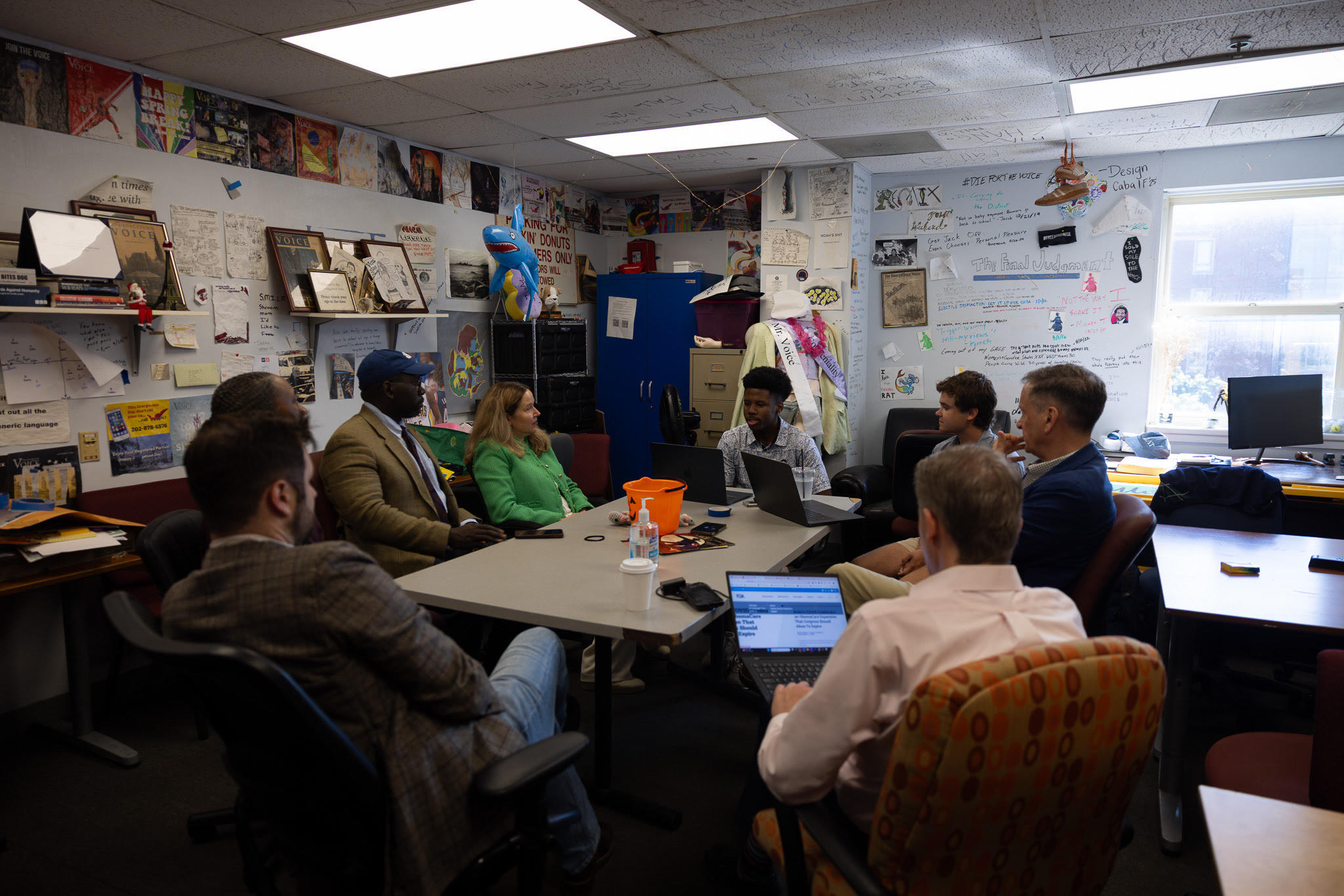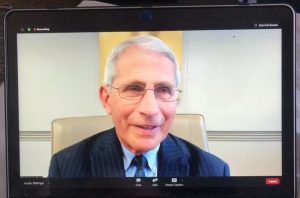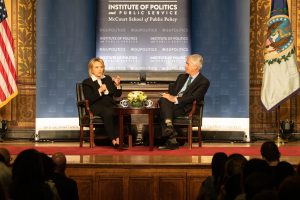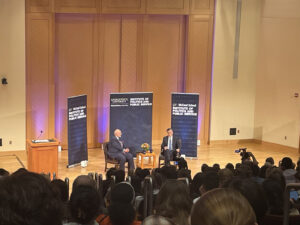Georgetown University’s Institute of Politics and Public Service (GU Politics) announced their 10th anniversary class of fellows, giving students access to the best and brightest in politics, including former politicians, political strategists and operatives, communications professionals, and journalists.
The fellows participate in panel discussions and campus events while hosting weekly discussion groups and office hours, helping to bridge the gap between the traditional classroom and world of politics.
Ahead of their start at Georgetown, the Voice sat down with the Fall 2025 fellows for a conversation on their past experiences and goals for the semester.
The Voice: What drew you to becoming a GU Politics fellow?
Amy Howe (MSFS’94, L’98): My topic is the Supreme Court in the Age of Trump. I cover the Supreme Court, so I’m not really in politics. I used to talk about [the Court] in the sense that it was not necessarily a political institution. But I think at this point, the Supreme Court’s in a unique moment in its history, and the Trump Administration is using it to a certain extent, as a political institution.
Rob Flaherty: My area of discussion is about the information environment and how it impacted the 2024 Election, how it’s going to impact future elections, and how it’s going to impact campaigns and our politics. I think the best trendcasters are going to be young people, so the chance to have that discussion on college campuses I think will be sharpening for me.
Scott Jennings: I’m here for a couple of reasons. One, I thought the Fellows group was terrific. I think all these people are amazing. It’s fun to be with a high-level group. Two, I think it’s good for conservatives to go on college campuses and other places where you might not always expect to find conservative voices. So for me, that’s part of my professional life, being a conservative in a place that’s not known for warehousing those kinds of voices. I tend to think this sort of cross-pollination is good for everybody, and I enjoy doing it.
The Voice: How did your work in politics lead you to Georgetown?
Jamelle Bouie: I’ve been at The [New York] Times for about five years now. I cover politics and history, and I was eager to participate in this at Georgetown. Just to have an opportunity to talk with students about the U.S. at this point in its history. My discussion group is on constitutional reform and revision and amendment, the aim being to think about the Constitution as a more flexible object that can be changed, and think about the kind of changes we’d like to see in the rules that govern our political world.
Laphonza Butler: I’m here because Mo [Elleithee, GU Politics Executive Director] is persistent. And I think that this is a time where the greatest opportunity to get to a solution is going to be found at the intersection of multiple things. Silos are no longer the place where problems will be solved, and I think there’s no better sort of messy intersection than college campuses. You have young scholars coming from all over the country and the world, from different economic backgrounds, different social backgrounds, religious backgrounds. The topic for my discussion is about artificial intelligence and the future of work. You have one of the biggest disruptions of their generation—our generation—sort of happening in real time:How we develop the policy and how policy makers get informed about the choices we make about this technology. Those solutions and ideas are going to come from that messy intersection, so why not just be in the middle of the mess?
Mark A. Green: I entered politics because I found leaders that I believe in. I’m the first American of my family. I didn’t grow up in politics at all, but Governor Tommy Thompson’s school choice and welfare reform convinced me to go into politics, and then Jack Kemp, Ronald Reagan, [and other] inspirational figures. I’m now at the point where politics has been a way for me to get involved in a passion of foreign policy, helping to lift lives and bring opportunities around the world. Sure, I’ll share some of my experiences, but I’m here to learn. I’m really here to turn to students and say, “Okay, help me think through this. Help me figure out what we do next.” We’re at a crossroads moment in American engagement around the world; what should we be doing? How can we do it better? How can we do it faster?
The Voice: Try to “pitch” your group to its model student.
Howe: For me, it’s anyone who’s interested in the Supreme Court. As I said earlier, I think the Supreme Court’s at a unique moment in its history. We’re going to look at the different actors in the Supreme Court ecosystem right now. We’ve got the Trump administration, but we also have the justices themselves. We have the other litigants before the courts, and then we have the different ways in which the court is acting, both on its merits docket, which is the traditional way that it rules, but then also the emergency docket, which is taking up more and more of the court’s time. The overall arc is to look at how the Supreme Court is operating in the age of Trump, and how the Trump administration is using the Supreme Court as part of its agenda.
Bouie: I’d say any student who’s interested not simply in the hot-button issues of American politics, but in the bigger questions of American politics, and specifically questions around the structures of the American political system, and the impact of the 13th, 14th, and 15th Amendments that we’re still discussing today. Students who are interested in the circumstances of the creation of the Constitution and of the passage of amendments, and why we seem to get amendments during some points, but we don’t get them during others.
Butler: It is a conversation and a discussion for any Georgetown student, whether they’re interested in politics and public service or business and entrepreneurship. [AI] is a technology that is now today, and will in the future, be disruptive and transformational for our economy, and so I would want to attract any and every Georgetown student into the conversation. The bigger the mess, the better.
Flaherty: I think the ideal student is anyone who consumes content. I think there are really broad intersections here. There’s a lot of intersecting interests, and a lot of people can have really good perspectives. So, anybody.
Jennings: I’m looking at different institutions on a week by week basis. Are they working? Are they not? Do people have confidence in them? Do they not? Are they failing? If so, why aren’t they succeeding? I think each week will be a healthy mixture of some discussion of that week’s institution, plus responding to what’s going on. So I think anybody who wants to come and talk about current events, plus institutional integrity and confidence, and maybe even have some debates will find it to be a fun experience.
Green: The students that I would hope would be attracted [to my discussion] are, A: those who like to think about the world, and B: those who are willing to challenge and be challenged. There are some extraordinarily good things happening around the world because of the engagement of young people. Those ideas come not from the halls of Congress or Foggy Bottom. They come from campuses. They come from young people saying, “Hey, why the heck can’t we do this?”
The Voice: What’s a piece of advice you would give to your college-aged self that might inspire students today?
Flaherty: When you hear people like us tell their stories about their careers it sounds like a very linear story, but the reality is, the lived experience is not super linear. So I think it’s important to remember that there will be a moment where you’re like, “What am I doing in my life?” And that is normal, and that is okay, and that’s a good thing.
Bouie: You can do as much planning and preparation as you want in college, but ultimately the kinds of things you end up doing might not be related to [what you study]. I didn’t study journalism in college. My honest advice to my younger self and to any students is you should obviously try to do well in school. But don’t take it too seriously. Enjoy the fact that you have more time than you realize to get to know people, to learn things, to take classes and subjects that you may have no relation to what you want to do in life.
Howe: Your career is not going to be linear. It may be serendipitous. Your career is a long one, so don’t compare yourself to other people. Like, yeah, sure. It’s great to have the profile because you’re running this campaign at 30, or there’s the “Top 30 Under 30” and the “Top 40 Under 40.” And, you know, I wasn’t on any of those lists. I’m 54 years old, I’ve had dinner [with friends] who are counting the days until they retire. And I’m like, “I’m just getting started here.” You know, Nina Totenberg is still covering the Supreme Court at the age of 81. So, your career will be a long one, and you don’t have to be a huge success immediately. And hopefully you’ll find something where you like it so much that it won’t feel like work.
Jennings: I was a journalist in college, but not on campus. The ability to learn how to put pen to paper makes you extraordinarily valuable—almost indispensable in organizations. As someone who now interviews a lot of people and hires people and interacts with a lot of people in politics and the media, I feel like it’s a declining skill. So if you want some practical advice, write and find practical ways to apply it, either on or off campus, and it’ll never let you down.
The Voice: On a less serious note, will each of you be cheering on the Georgetown basketball team this fall/winter?
Butler: The right answer is yes!
Howe: As long as they aren’t playing the University of North Carolina.
Green: Or the [University of Wisconsin-Madison] Badgers.
Jennings: As a Kentuckian and a Louisville graduate, this is a difficult question.
The Voice: What is the one thing you hope to leave your time on the Hilltop with?
Flaherty: I have a decent theory of what happened and what is happening. I don’t know that I have a full theory on what’s going to happen when it comes to the information environment and media. One of my discussion areas is on how AI is going to impact the media and how AI is going to impact political campaigns, and I don’t know. So if I can come out of this with a more baked theory on that with the help of folks here, that is something I’m really hoping to get out of this.
Butler: I think I enter the discussion space with lots of questions. And a sort of theory of the case organizationally, institutionally, as I think about the years that I spent in the institution of the traditional labor movement. What does tomorrow’s labor movement look like? What protections need to be in place relative to AI? I don’t know what the answers are, I’m not even sure I have a clear sense of what the shifts that are gonna come relative to employment structures. I come with questions, and hopefully I leave with the students having helped me develop some theory of the case in response.
Green: I wouldn’t have achieved anything without some very, very helpful people along the way. And if I can be helpful to anyone here who is thinking of getting involved—particularly in foreign policy-–in any way, that’s a success.
Bouie: I find discussion with other people to just be generative in general. That’s what I’m hoping to get out of this, just having serious discussions with students and hopefully they learn more as well.
Interested in attending the Fellows’ discussion groups or scheduling one-on-one office hours? Discussion groups begin Sept. 22:
Scott Jennings, Republican strategist; Political Commentator, CNN; Former Special Assistant to the President for Political Affairs (George W. Bush Administration) will host his discussion group, American Institutions: A Crisis or an Opportunity?, on Wednesdays from 5:15-6:45 PM.
Amy Howe (MSFS ’94, LAW ’98), Co-founder & Primary Reporter, SCOTUSblog will host her discussion group, The Supreme Court in the Age of Trump, on Tuesdays from 2:00-3:30 PM.
Laphonza Buter, Former U.S. Senator, (D-Ca.); former President of SEIU Local 2015; former Director of Public Policy, AirBnB, will host her discussion group, AI, Labor, and the Politics of the Future of Work, on Tuesdays from 4:00-5:30 PM.
Rob Flaherty, Former Assistant to the President and White House Director of Digital Strategy (Biden Administration); Former Deputy Campaign Manager, Harris for President, will host his discussion group, The Politics of Attention: Media, Campaigns, and Our Broken Information Environment, on Wednesdays from 4:00-5:30 PM.
Jamelle Bouie, Opinion Columnist, The New York Times, will host his discussion group, Constitutional Crisis and Revival, on Thursdays from 2:00-3:30 PM.
Mark A. Green, Former Administrator, USAID (Trump Administration); Former U.S. Ambassador to Tanzania; Former Member of Congress (R-Wi.), will host his discussion group, A Crossroads Moment for American “Soft Power,” on Thursdays from 4:00-5:30 PM.






